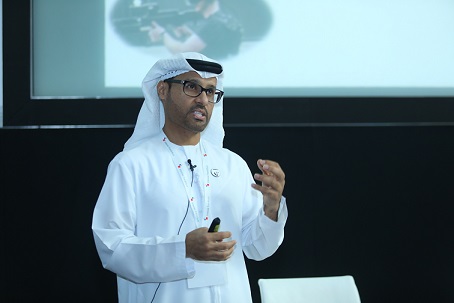 AI, IoT and 4IR technologies provide a multitude of opportunities for the UAE
AI, IoT and 4IR technologies provide a multitude of opportunities for the UAE
Top level advisors to UAE government entities gathered for the inaugural World Security Forum in Abu Dhabi have highlighted trends and opportunities brought on by AI, IoT and Industry 4.0.
Organised by Messe Frankfurt Middle East, with UK’s Consilium as a Knowledge Partner, the World Security Forum concluded at Abu Dhabi Global Market yesterday.
Speaking during a keynote on ‘Future Security Trends including Cyber, Artificial Intelligence and Autonomous Systems’, Dr. Mohamed Hamad Hareb Al Kuwaiti, Executive Advisor for the UAE’s Supreme Council for National Security, stressed the opportunities presented by emerging technology far outweigh concerns presented by greater autonomy.
“There were many assumptions that the industrial revolution in the 1700’s would take away from the labour market. While that was true in a lot of ways, it also created unforeseen opportunities,” said Al Kuwaiti.
“Fast forward to today, where the 4th Industrial Revolution is creating greater global interconnectivity via the introduction of new technologies, robotics and AI, and we see the same concerns as before but with a multitude of corresponding opportunities.”
Highlighting the potential impact of AI across various government sectors, Al Kuwaiti pinpointed how public sector entities can leverage AI solutions in areas including: cyber security, to detect and monitor malicious activity; behavioural analysis, to aid police by predicting crimes; monitoring economic growth through time lapse satellite imagery; predicting climate change; and improving doctors’ abilities to provide accurate diagnoses.
“The UAE is moving towards an AI-centric government; a vision being translated in initiatives which leverage technology – for example the Mohamed Bin Zayed University of Artificial Intelligence, a true world first,” explained Al Kuwaiti. “AI is the electricity of Industry 4.0 and it is something that has to be embraced by governments.”
Delivering a presentation session on ‘Security in the Age of Digital Media’, Sameera A Romaithi, Executive Advisor for the UAE’s Supreme Council for National Security, believes the advent of digital media has triggered an information revolution that is forcing governments and organisations to rethink strategies on managing information.
“There are around one million new social media users every day and the digital revolution has enhanced our ability for data manipulation,” said Al Romaithi. “While it is a double-edged sword, there are many opportunities that can leveraged.”
Al Romaithi outlined several threats created and exacerbated by digital media, including the spread of misinformation, disinformation, propaganda, fake news and the emergence of deep fakes.
“Deep fakes are growing in sophistication; they are becoming available to more and more people to create a certain world view and these echo chambers become filled with deep fakes,” said Al Romaithi, who also highlighted the need for regulators to react in a timely manner to counter misleading content and preserve the integrity of a digital media industry not bound to the same standards as traditional media.
“We need to get ahead of the game and be flexible in creating comprehensive content that builds effective counter narratives; we must design new threat assessment framework; create awareness about the challenges of digital media; and increase reason on algorithms and behaviour science to find the balance between regulations that enable innovation and growth,” explained Al Romaithi.
Featuring perspectives from the GCC, Asia, Europe and the US, the World Security Forum agenda comprised a series of keynote speeches and panel discussions examining the regional security landscape; strategy impacts; digital security mapping to combat global technology dynamism, threats to global business and insurance; and means of leveraging intelligence, surveillance and reconnaissance for a safer world.
The two-day event’s authoritative public and private sector speaker line-up also included National Security Advisors, Secretaries of Defense and State, C-suite executives of major corporations, government ministers, specialists and business development directors from the security, insurance, shipping, finance, legal, cyber, space security and satellite industries.

